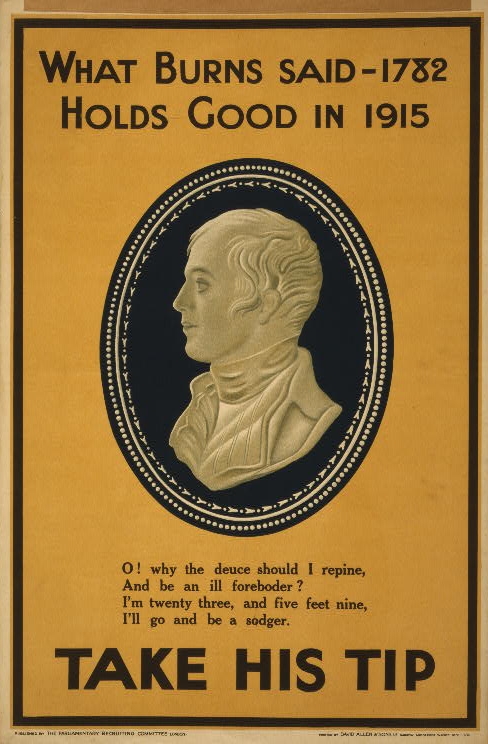Month: July 2016
‘I’ll go and be a sodger’

Exactly one hundred years ago, the Battle of the Somme, one of the deadliest in history, was raging on the fields of France. Originally intended as a quick and decisive victory for the allies, the Battle became one of attrition, with the result that over one million men were wounded or killed over the course of four and a half months of bloody conflict. Tanks were used for the first time, and the battle saw the first significant use of air strikes; changing the nature of warfare forever.
Robert Burns wrote many poems and songs on the subject of war, as well as spending the latter part of his life with the Royal Dumfries Volunteers. During the Great War, over a hundred years after his death, Burns continued to be celebrated. Burns clubs increased from 227 in 1915, to 254 in 1918, and Burns Suppers continued to be held, even at the front. Events such as the garlanding of his statue in Glasgow and the placing of the floral tribute in Dumfries continued, and Burns concerts and celebrations were held throughout the war, now often in aid of troop entertainment and charitable fundraising.
During the war the militaristic aspects of the Bard’s work were emphasised, as well as his desire to stand up to tyranny and oppression. Scots Wha Hae was included in several martial anthologies, including Oxford University Press’s ‘Poems of War and Battle’, published in 1914. His time spent as a volunteer in Dumfries was also very useful to those claiming he was an ardent militarist, and he appeared on a recruitment poster, using a quote from his poetry, which encouraged men to join up. At a Burns Supper in London in 1918, John Buchan made this declaration in his Immortal Memory: ‘If you wish for a statement of the Allies’ War Aims you will find it through the poetry of Burns. Freedom, tolerance, sympathy in the State; devotion, courage, sacrifice in the citizen – it is all there’.
Other groups sought to distance themselves from the official view of Burns, emphasising the radical, rather than military, elements of poems like Scots Wha Hae, and also pointing out how Burns often wrote about the negative aspects of war and the hardship it brings. Willie Steward, organiser of the Scottish Independent Labour party, believed that Burns was being misrepresented by the government, and declared: ‘I cannot help but think if [statesmen] had ranted of Burns less and imbibed his spirit more, it had been better for us all to-day’.
As is often the case with our Bard, his views are difficult to pin down. He wrote many poems emphasising the negative aspects of war, but also supported the American and French revolutions. However, as can be seen above, whatever his views during his lifetime, his legacy after his death continued in ways beyond his control.
References: http://www.ijsl.stir.ac.uk/issue6/goldie.htm – David Goldie, Burns and the First World War, International Journal of Scottish Literature, Issue 6, Spring/Summer 2010.